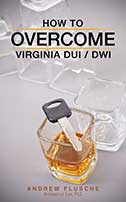Overview of Underage DUI Charges in Virginia
 Like other states, Virginia imposes a minimum drinking age of 21. That means possessing, drinking, or purchasing alcohol is illegal for anyone under the age of 21.
Like other states, Virginia imposes a minimum drinking age of 21. That means possessing, drinking, or purchasing alcohol is illegal for anyone under the age of 21.
Although no one expects to face an underage DUI charge, it happens more often than you might think.
In 2019, 17% of high school students reported riding with an alcohol-impaired driver, and 5% reported driving after drinking alcohol at least once within the last month. Virginia imposes serious penalties for an underage DUI conviction.
Although underage drinking and driving is a serious crime, we know that not everyone facing an underage DUI charge is guilty. To discuss what happens if you get a DUI under 21, contact our team at Flusche & Fitzgerald, Attorneys at Law, PLC today.
What Happens If You Get a DUI Underage
Virginia imposes a zero-tolerance alcohol policy for underage drivers. That means an underage driver can receive a DUI conviction even if their BAC was below .08%.
If an underage driver is convicted with a BAC of between .02% and .08%, the underage DUI is considered a Class 1 misdemeanor.
The penalties may include the following:
- Up to 50 hours of community service,
- License suspension,
- Attendance at a Virginia Alcohol Safety Action Program, and
- A fine of up to $500.
If an underage driver is convicted with a BAC above .08%, the DUI charge is usually charged the same as a charge against a driver over 21.
A first-time DUI conviction carries the following potential penalties:
- Up to one year in jail,
- A fine of up to $2,500,
- Installation of an ignition interlock device,
- Completion of the Virginia Alcohol Safety Action Program, and
- License revocation for one year.
A second DUI conviction within 10 years of the first conviction carries the following possible penalties:
- Up to one year in jail, with 10 days being mandatory minimum time,
- A fine of up to $2,500,
- Installation of an ignition interlock device,
- Completion of the Virginia Alcohol Safety Action Program, and
- License revocation for three years.
A third DUI within 10 years of the initial DUI conviction can carry the following potential penalties:
- Up to five years in prison,
- A fine of up to $2,500,
- Vehicle forfeiture,
- License revocation for an indefinite period,
- Completion of the Virginia Alcohol Safety Action Program, and
- Installation of an ignition interlock device once driving privileges are restored.
Depending on the time between a first and third conviction, the court may require a minimum 90-day jail sentence. These penalties apply to underage DUI charges as well.
Valid Legal Defense to an Underage DUI
In some DUI cases, a legal defense may help you lower your penalties or avoid jail time. Valid legal defenses that apply to underage DUI cases include:
- The officer lacked reasonable suspicion to pull you over,
- You did not receive an advisement of your rights, and
- Inaccuracies with your chemical test.
Getting your charges reduced or dismissed is possible when one of these legal defenses applies. Our team will review your case to determine the best course of action for you.
Getting a DUI Under 21: Consequences of a Conviction
In addition to the criminal consequences of a DUI under 21, a conviction can derail other aspects of your life, like your education and job opportunities. It can also result in increased expenses for things like insurance.
College Applications and Scholarships
Some universities and community colleges evaluate the backgrounds of prospective students to ensure it does not recruit individuals who will tarnish the school’s reputation.
Specifically, schools may ask you to disclose any criminal convictions on your record. A school can deny your admission based on an underage DUI conviction.
Additionally, many schools implement policies that specifically prohibit their students from engaging in certain activities, such as driving under the influence.
Getting a DUI conviction while actively enrolled can lead to severe consequences, including disqualification from extracurricular activities, loss of scholarships, or expulsion from the school.
Higher Insurance Rates
As a general matter, young drivers pay more for insurance coverage than older drivers.
However, drivers convicted of DUI often must purchase insurance coverage above the standard minimum limits and provide proof of coverage by filing a Financial Responsibility Certificate with the state.
And this high cost can last for years. This insurance coverage often costs more than regular insurance and can add to the out-of-pocket costs associated with an underage DUI.
Job Opportunities
DUI convictions go on your criminal record and will be visible to future employers who perform background checks prior to offering you a job.
While you may be able to explain that the conviction occurred when you were underage, the employer may impose a strict policy against hiring anyone with a criminal conviction.
Thus, a DUI conviction can disqualify you from certain jobs without consideration of your other qualifications.
Contact Flusche & Fitzgerald Today to Discuss Your Underage DUI Charges
Andrew and Fitz have represented thousands of people facing DUI charges, including people under the age of 21. Our experience navigating DUI charges gives us an advantage in handling your case.
An underage DUI conviction can result in significant fines and the possibility of jail time. When your freedom is at stake, you cannot afford to hire an attorney who is ill-equipped to defend you.
Do not jeopardize your freedom. Contact Flusche & Fitzgerald to discuss your underage DUI.




